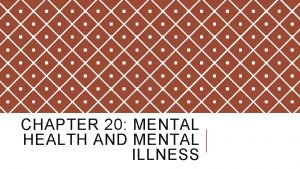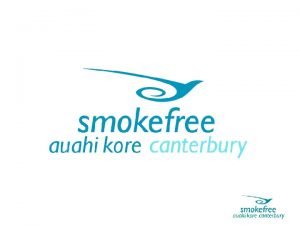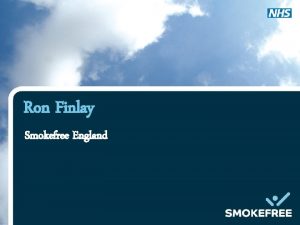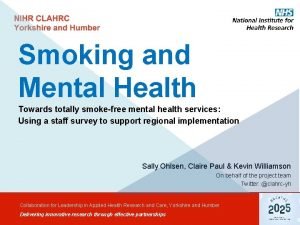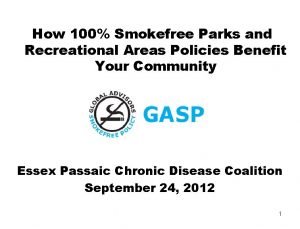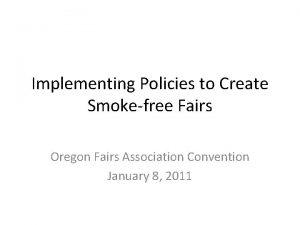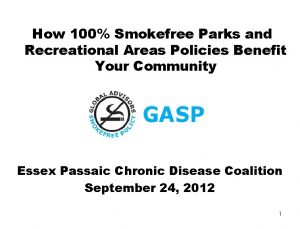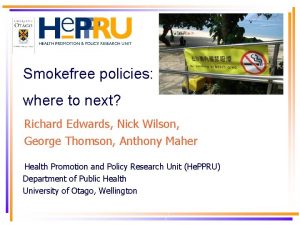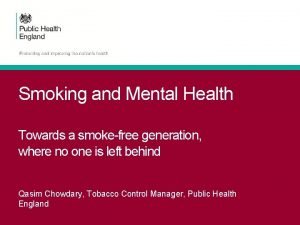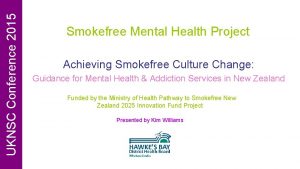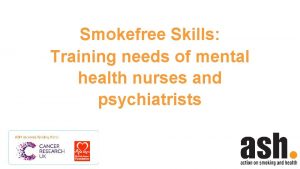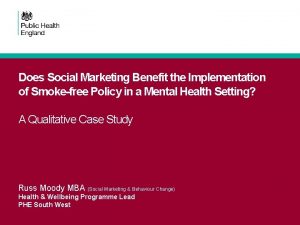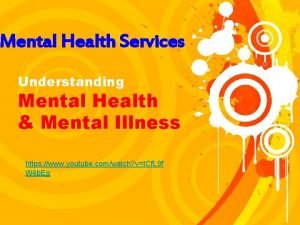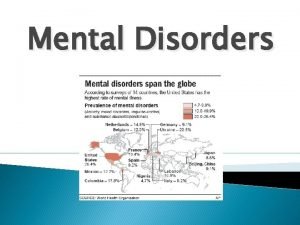The implementation of smokefree ecigarette policies in mental


![1] Smoking rates in people who use Mental Health and/or Drug & Alcohol services 1] Smoking rates in people who use Mental Health and/or Drug & Alcohol services](https://slidetodoc.com/presentation_image_h2/63fdafe0c0febb1df090bc0024fa466d/image-3.jpg)


![1] Smoking rates in people who use Mental Health and/or Substance Use services in 1] Smoking rates in people who use Mental Health and/or Substance Use services in](https://slidetodoc.com/presentation_image_h2/63fdafe0c0febb1df090bc0024fa466d/image-6.jpg)

















- Slides: 23

The implementation of smokefree & e-cigarette policies in mental health & substance use services Debbie Robson, RMN, Ph. D Senior Research Fellow

People who use mental health and/ or substance use services smoke more than the wider general population Why tobacco smoking still matters………. More likely to die from a tobacco related illness than their mental illness or their primary substance use Smoking gets in the way of their recovery Stopping smoking may improve mental health & substance use outcomes
![1 Smoking rates in people who use Mental Health andor Drug Alcohol services 1] Smoking rates in people who use Mental Health and/or Drug & Alcohol services](https://slidetodoc.com/presentation_image_h2/63fdafe0c0febb1df090bc0024fa466d/image-3.jpg)
1] Smoking rates in people who use Mental Health and/or Drug & Alcohol services in England Overview 2] Survey findings about smoking and vaping rates in the South London & Maudsley NHS Foundation Trust 3] Experience of introducing e-cigarettes into an integrated stop smoking service in a Drug & Alcohol Service in South London

Smoking prevalence in England General population 15% We don’t know how many people who use mental health inpatient and community services smoke Commissioning for quality and innovation. CQUIN 9 CQUIN* data (selected mental health trusts) – smoking prevalence among inpatients 49%

Smoking prevalence* in Drug & Alcohol services in England (2017 -2018) Numbers in treatment by main substance used Smoking prevalence by substance used 3% received smoking cessation support * In the 28 days before the start of treatment PHE (2018) Adult substance misuse statistics from the National Drug Treatment Monitoring System (NDTMS)
![1 Smoking rates in people who use Mental Health andor Substance Use services in 1] Smoking rates in people who use Mental Health and/or Substance Use services in](https://slidetodoc.com/presentation_image_h2/63fdafe0c0febb1df090bc0024fa466d/image-6.jpg)
1] Smoking rates in people who use Mental Health and/or Substance Use services in England Overview 2] Survey findings about smoking and vaping rates in the South London & Maudsley NHS Foundation Trust 3] Experience of introducing e-cigarettes in a bespoke stop smoking service in a Drug & Alcohol Service in South London

• Mental health and substance use services • Smokefree since Oct 2014 South London and Maudsley NHS Foundation Trust

Improved infrastructure • • E Systems approach to support tobacco harm reduction I S RA F N TR U TR AIN UR CT TR EA Treatment pathway TM EN T S IN G Smokefree grounds & policy Hospital tobacco dependence treatment service Electronic referral system Patient and staff audits R RIE R BA • Easy access to evidence based medicines • Behavioral & psychological support • Supportive policies to allow the use of e-cigarettes Staff training pathway • E-Learning training about smoking • Classroom based advanced skills training Understanding & addressing barriers to implementation Eg fears violence will increase if service users could not smoke Collaborations between SLa. M & Addictions Dept, King’s College London

Survey - 2018 • Total sample n=360 • • South London and Maudsley NHS Foundation Trust Clients: Mental health n=102 Clients: Drug & Alcohol n=83 Staff: Mental health n-133 Staff: Drug & Alcohol n=42

Smoking & vaping prevalence among CLIENTS Current exclusive smokers Current exclusive vapers Concurrent users 66% Clients in D&A services have higher smoking rates, but lower vaping rates than MH clients 31% 24% 17% 15% 5% Mental Health Services Drug & Alcohol Services

CLIENTS STAFF Current exclusive smokers Current exclusive vapers Concurrent users 66% Staff in D&A services have higher smoking rates & vaping rates than MH staff 31% 24% 17% 15% 5% Mental Health Services 21% Drug & Alcohol Services 5% 7% 21% 5% 5% Mental Health Services Drug & Alcohol Services

What type of e-cig devices did clients use? Device type Mental health Drug & Alcohol Disposable 33% 6% Rechargable prefilled 21% 12% Rechargable refillable (tank) 21% 41% Rechargable refillable (mod) 10% 21%

Relative harm perceptions (n=360) E-cigarettes are LESS harmful than tobacco to a smoker’s health • CLIENTS – 53% • STAFF – 87% Significant difference between the proportion of clients and staff who perceived that e-cigarettes are less harmful or much less harmful than tobacco More positive beliefs among • current vapers compared with smokers • staff who have had training

Integrated tobacco dependence clinic within a Drug & Alcohol Service, South London

Integrated tobacco dependence treatment clinic Aug ‘ 14 – Dec ‘ 18 • • ½ day drop in Up to 6 sessions NRT, varenicline, behavioural support Substance use worker • Free disposable e-cigarette from Oct ’ 16 Jan ‘ 19 -Oct ‘ 19 • • 5 days a week Up to 12 sessions NRT, varenicline, behavioural support Mental health occupational therapist • Wider range of e-cigarettes • Funded by SLa. M • Supported by a grant from Cancer Research UK

Nicotine products supplied (free of charge) Patches, gum, lozenges, inhalator, mouth & nasal spray. All strengths 18 mg/ml nicotine strength only; 2 flavours Choice of e-liquid flavours & strengths 20 mg/ml nicotine strength only; 4 flavours (nic salts)

New clinic increased access Over a 3 -year period (August ‘ 14 - July ‘ 17) 74 people accessed the service Over 10 -month period (Jan ‘ 19 - Oct ‘ 19) 124 people accessed the service

Baseline findings from new clinic (n=124) MEN 79% AGE 45. 3 YEARS (RANGE 22 -63) 27% HOMELESS

Baseline findings (n=124) Mean cigarettes per day 19. 3 (max 90) Type of cigarettes smoked Intention to quit Stop in one go 39% Manufactured 18% Roll your own 54% Both 28%

Nicotine products chosen at 1 st appt Out of total sample 77% also chose NRT 1 –Eburn 3 – no EC 54% 43%

Additional observations……. • Majority finding devices easy to use • Concern about cost & access post treatment • Many clients smoke their main problem drug (heroin/crack) • Cannabis use is a common secondary/tertiary drug problem and undermines quitting tobacco completely

Summary In a local service, higher smoking rates but lower vaping rates are observed among clients in D&A services vs Mental Health services Offering e-cigarettes as part of an integrated tobacco dependence clinic within a D&A service attracts clients to engage with and use less harmful nicotine products Nationally - Rates of smoking among people accessing D&A and/or Mental Health services remain very high – Tobacco smoking still matters……. Better data exist for clients accessing D&A services than Mental Health services Only 3% of clients received treatment for their tobacco use

Acknowledgements deborah. robson@kcl. ac. uk • Georgia Whyte, Mike Kelleher, Luke Mitcheson, Emily Finch, Martin Mc. Cusker, Paul Lennon, Liz Mc. Donnell, Mick Collins South London & Maudsley NHS Foundation Trust • Gilda Spaducci, Mairtin Mc. Dermott, Leonie Brose, Ann Mc. Neill- King’s College London • Cancer Research UK • Liberty Flights, E Burn, Lambeth Council
 Mental health and mental illness chapter 20
Mental health and mental illness chapter 20 Mental health jeopardy questions
Mental health jeopardy questions Quá trình desamine hóa có thể tạo ra
Quá trình desamine hóa có thể tạo ra Sự nuôi và dạy con của hổ
Sự nuôi và dạy con của hổ Các châu lục và đại dương trên thế giới
Các châu lục và đại dương trên thế giới Dot
Dot Bổ thể
Bổ thể Nguyên nhân của sự mỏi cơ sinh 8
Nguyên nhân của sự mỏi cơ sinh 8 Phản ứng thế ankan
Phản ứng thế ankan Thiếu nhi thế giới liên hoan
Thiếu nhi thế giới liên hoan Tia chieu sa te
Tia chieu sa te Bài hát chúa yêu trần thế alleluia
Bài hát chúa yêu trần thế alleluia điện thế nghỉ
điện thế nghỉ Một số thể thơ truyền thống
Một số thể thơ truyền thống Sơ đồ cơ thể người
Sơ đồ cơ thể người Công của trọng lực
Công của trọng lực Bảng số nguyên tố lớn hơn 1000
Bảng số nguyên tố lớn hơn 1000 đặc điểm cơ thể của người tối cổ
đặc điểm cơ thể của người tối cổ Tỉ lệ cơ thể trẻ em
Tỉ lệ cơ thể trẻ em Các châu lục và đại dương trên thế giới
Các châu lục và đại dương trên thế giới ưu thế lai là gì
ưu thế lai là gì Thẻ vin
Thẻ vin Các môn thể thao bắt đầu bằng tiếng nhảy
Các môn thể thao bắt đầu bằng tiếng nhảy Tư thế ngồi viết
Tư thế ngồi viết
